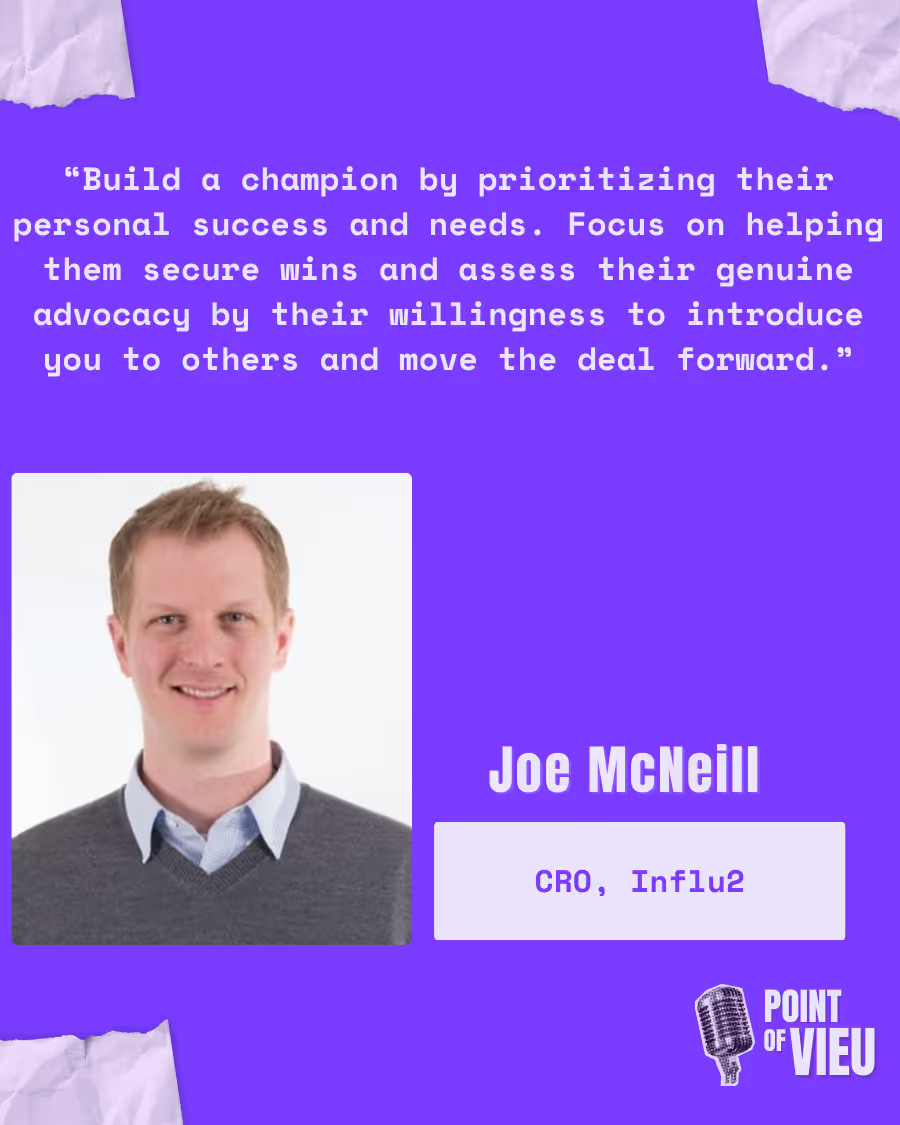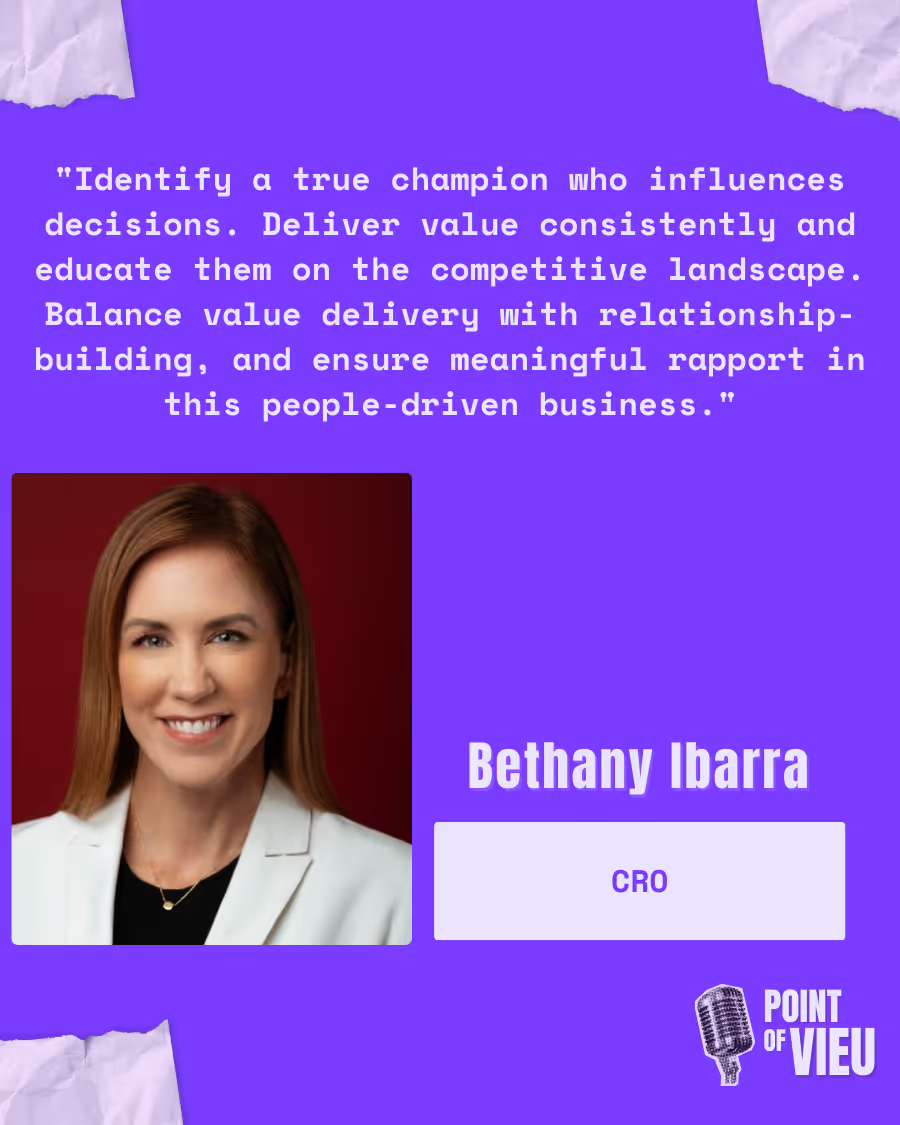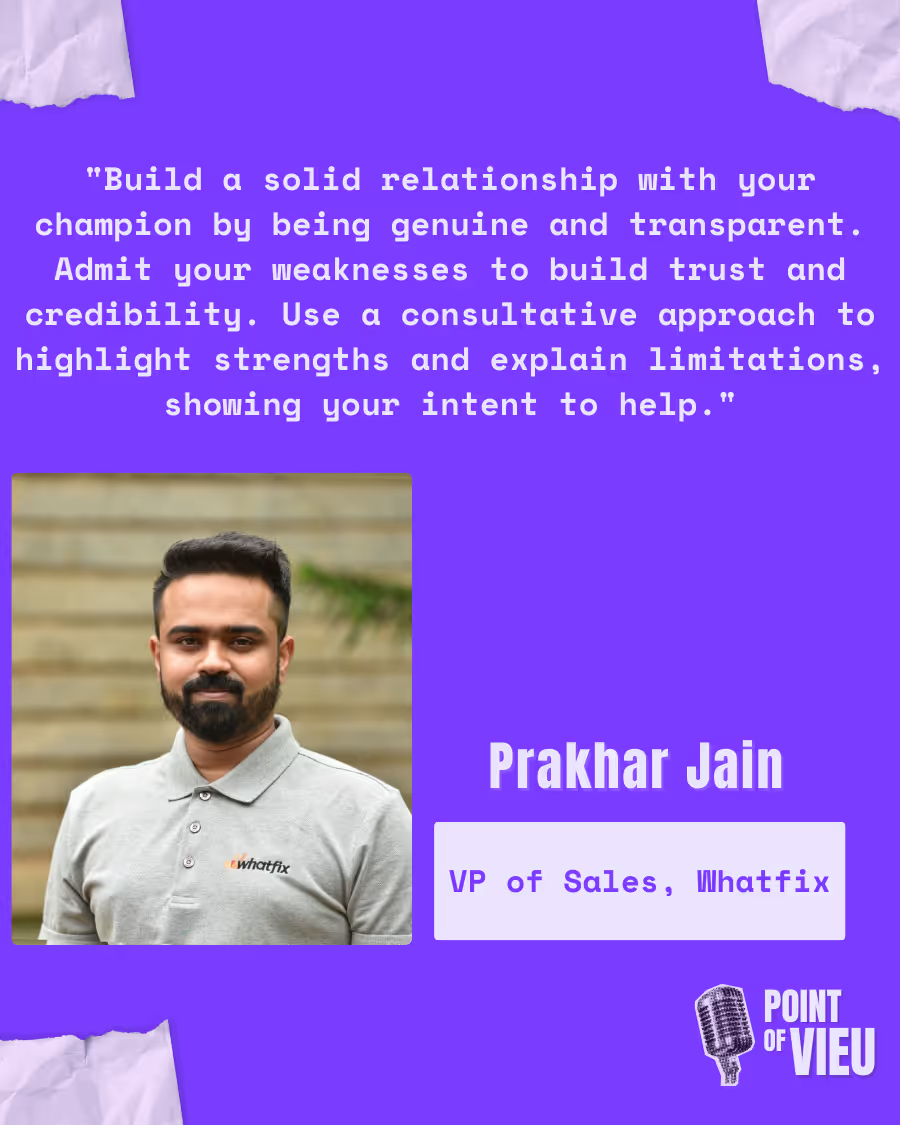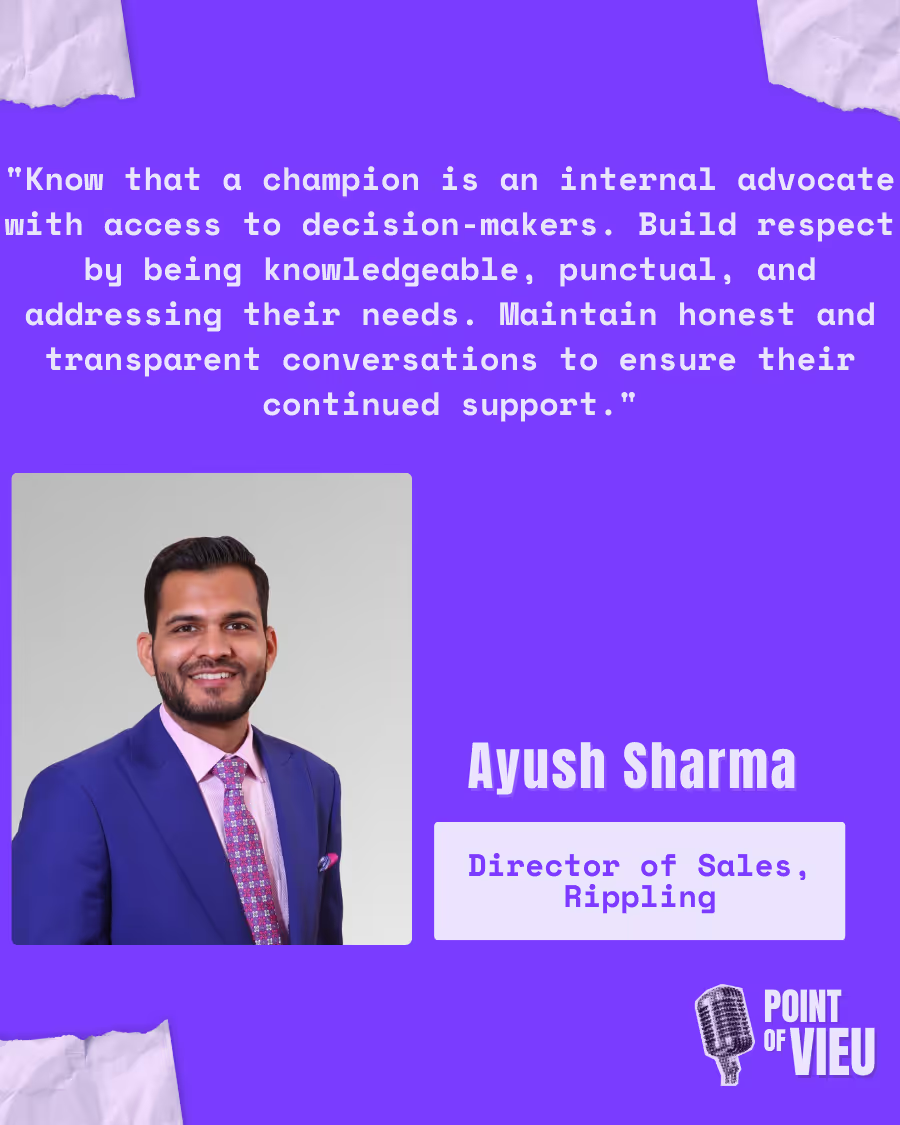B2B sales rely on trust and convincing the right people to buy your product. Champions fulfill both determining factors of B2B sales. A sales champion believes in the value of your product and plays an influential role in the decision-making process of their company. The champions' personal gains in your successful sales make them go out of their way to help you clinch the deal.
But how do you build relationships with the right champion? That’s precisely what our guests uncover in the first episode of the “Point of Vieu” podcast.
“How to build a solid relationship with a champion?”
Read on to know about the tips given by our experts:
Joe McNeill, Chief Revenue Officer, Influ2

Joe McNeill is the CRO at Influ2. They do contact focused advertising to help sales and marketing teams align and improve prospecting conversion rates. He’s a B2B Technology Sales Leader who combines an enthusiasm for client service delivery, employee empowerment, and robust revenue operations to position organizations to scale & grow.
“My suggestion to build a relationship with a champion is to really focus on what is in it for that person. And help them get the win that they need. Sometimes, we get too focused on our internal sales process or the business case that we want to build to close the deal with a prospect’s executive team. But the business case that we're going to leverage to close a deal may not be the business case that really helps a champion.
So, it is important to focus on helping the champion in a meaningful way, and then maybe we can build a broader business case for the executive team. But the reality is - to get a person to champion a deal forward and put their political capital on the line to move a deal forward, you need to focus on how you can help them first.
You need to ask yourself: ‘How can I make this a win for them and their department?’
‘Are they champions?’ A lot of times, they are detractors, but they’ll claim to be champions.
‘Are they doing what they say?’
‘Are they willing to introduce you to broader groups?’
‘Are they willing to champion the deal forward?’
‘Are they helping in a meaningful way?’
The ones that try to isolate you by only talking to them are typically the ones that aren't helping with the deal."
Bethany Ibarra, Chief Revenue Officer

Bethany spent the first half of her career working across the business cycle at Motorola. She uncovered an opportunity that led her to build her first P&L, and launch her first product. Since then, she has worked in commercial leadership in companies such as Lenovo, Google, and Motorola. Recently, she was the Chief Revenue Officer at an engineering firm that designed and developed machine learning systems.
“For starters, I would start by ensuring they are a champion, and what I define champion is – they can influence the decision-making process. There are usually 8-12 people involved in the sales process depending on the company. I'm specifically referring to B2B enterprise selling in this context. You must remember what a champion is not: an advocate.
Someone who you used to work with but they're in HR, and you're selling into an engineering solution. So, a champion is someone who influences the decision-making process, and then once you've identified that it's about delivering value. So, delivering value at every step of not just the sales process, but the full client or customer life cycle in which you support that business.
A common way you can drive value in the selling process is if they're coming to you to purchase a CRM or buy a component part like a chipset. It is expected that you know more about that category than your buyer at the other end.
So even just educating them on the competitive landscape, what the different technologies mean, but really finding a way to deliver that value that's meaningful. Then, it's a mix of delivering value and relationship building.
So, I talk about a formula about a 70:30 mix with my teammates. In a B2B business, they're looking for that value. But they are also looking for relationship-building and rapport-building in a meaningful appropriate way. This is a people-driven business. Even though we are selling technology or selling a product, we're still human, and we are interacting with humans. So don't forget to focus on that report building as well.”
Prakhar Jain, VP of Sales, Whatfix

Prakhar was employee #1 at Whatfix and has been working with them for the last 10 years. Whatfix is a digital adoption platform that works with companies to simplify their end user experience. It strives to make technology user savvy. His role is to take care of new business for North America and EMEA.
"We should remember that we get little time with our prospects. I imagine the competition is getting the same time with a prospect as well. So how do you beat the competition?
My rationale about building trust with anybody whether in a sales cycle or life is to be human about it. Showing your genuine self and showing the best intent of wanting to help others brings a lot of trust and credibility.
I'm not shy in admitting my weaknesses. I'm very upfront about talking about my weaknesses. When I say mine, sometimes it could be Whatfix weaknesses as well. Of course, you must position it properly so that it doesn't jeopardize the deal for you. Our buyers understand that nobody is perfect.
If you admit to certain weaknesses, it helps you build more trust. If you admit to certain gaps in your product, it helps you build more credibility. It shows that you’re honest and transparent. If shows that you’re trustworthy.
Then, you'll be consultative in the process and talk about your strengths as well. With the right mix, it explains your positioning on various things. For instance, if you don't do something, why don't you? So, you explain that with more details and examples."
Ayush Sharma, Director of Sales, Rippling

Ayush currently leads the sales team at Rippling, Bangalore. His teams serve the US, EMEA, and Indian markets. He has seven years of experience in the B2B Saas space. He worked for companies like Whatfix for four years and worked at another Silicon Valley company called Carta.
“I've realized that it’s crucial for salespeople to understand the definition of what a champion is. There have been so many times, especially, with new sellers who think somebody who can talk nicely to them in a sales cycle is a champion, but that's not the right definition.
Champion is essentially an internal salesperson in that company for you. While you are on the outside, that person is your salesperson on the inside. A champion is someone invested in this buying journey and gains personally via promotion or is trying to solve a problem that directly impacts his role and has access to the buying power, i.e., he has access to the executive decision maker.
I think that these are the two most critical things about being a champion.
Content is king if you want to build a solid relationship with your champion. If you are smart, if you know your product, if you know your industry, if you know the problems that your product is solving for this company and this buyer, the champion will start respecting you. You can build that relationship by doing small things like being on time, serving the needs of the champion, and so on.
In a sales cycle, the champion will ask many things of you - questions, collaterals, and demos for various members of the team. The champions will see if you are on time and if you're doing a good job. The basic stuff.
During the sales cycle, you should test your champion every now and then to see if this is the right champion.
A champion can also evolve and change during a sales cycle. So, ask questions that you are doing to test the champion if they know the ins and outs that can you help make progress in the deal. If you feel that you're not able to reach the executive buyers and decision makers –you should test your champion again.
I think having a very honest and transparent conversation with your champion is fundamental to building a strong relationship.”
Conclusion
Building a solid relationship with a champion is crucial in B2B sales, as emphasized by the insights shared by our featured sales leaders. Each expert highlighted the importance of understanding the champion's role, delivering value, building trust, and maintaining open communication.
In the next episode, the experts share tips on how to avoid losing to your competitor.



